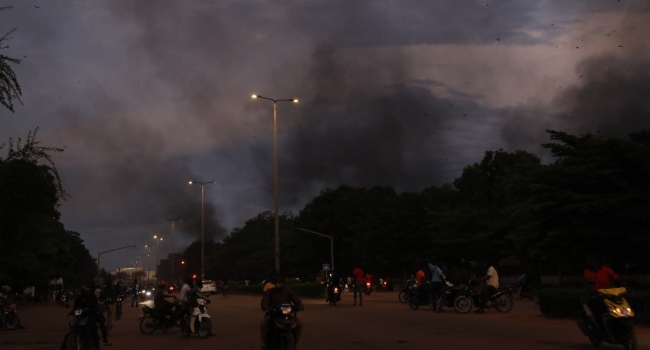Security forces fired tear gas at dozens of rock-throwing protesters outside the French embassy in Burkina Faso’s capital on Sunday, according to an AFP journalist, as unrest simmered in the West African country following its second coup this year.
Supporters of Burkina’s newest putsch leader had gathered outside the building in Ouagadougou a day after he accused the man he deposed of hiding out at a French base to plot a “counteroffensive”.
With French troops watching from the roof, the protesters had set fire to barriers outside and lobbed rocks at the structure when the tear gas volleys were fired.
The latest spasm of violence to convulse the deeply impoverished nation began on Friday when junior military officers said they had toppled junta leader Paul-Henri Sandaogo Damiba, accusing him of failing to quell jihadist attacks.
It marked the second coup this year in Burkina Faso and the latest in the Sahel region, much of which is battling a growing Islamist insurgency.
In a statement read out on national television on Saturday and signed by Captain Ibrahim Traore, the country’s new leader, the officers said Damiba “is believed to have taken refuge in the French base at Kamboinsin in order to plan a counteroffensive to stir up trouble in our defence and security forces”.
Later on Saturday, Damiba rejected the allegations that he was at a French base but provided no further details about his whereabouts.
France, the former colonial power in Burkina Faso, on Saturday denied “any involvement” in the coup or that “Burkinabe authorities have been hosted or are under the protection of the French military”.
In a written statement on the presidency’s official Facebook page, Damiba urged his rivals “to come to their senses to avoid a fratricidal war that Burkina Faso doesn’t need”.
The general staff of Burkina Faso’s army dismissed the coup as an “internal crisis” within the military and said dialogue was “ongoing” to remedy the situation.
Damiba himself came to power in a coup in January. He installed himself as leader of the country’s 16 million people after accusing elected president Roch Marc Christian Kabore of failing to beat back jihadist fighters. But the insurgency has raged on.




